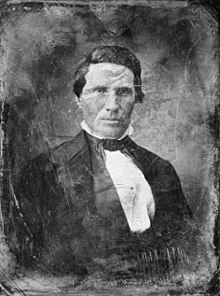Alexander William Doniphan
Alexander William Doniphan (born July 9, 1808 in Mason County , Kentucky , † August 8, 1887 in Richmond , Missouri ) was an American officer, lawyer and politician.
Early years
Doniphan attended Augusta College until 1824. After a subsequent law school, he was as in 1830 Lawyer admitted. He then began working in his new profession in Lexington , Missouri. He later moved to Liberty , also in Missouri, to work as a lawyer there too.
Political and military career
Doniphan was a member of the Whig Party . He was elected to the Missouri House of Representatives in 1836, 1840, and 1854 . Doniphan was a member of the Missouri Militia. By 1838 he had made it up to brigadier general there. That year he received an order from Governor Lilburn Boggs to take action against the Missouri-based Mormons . The order included the execution of Joseph Smith and other leaders of the movement. Doniphan arrested the Mormon leaders and expelled them from the country; he did not carry out the order for their execution.
When the Mexican-American War broke out , Doniphan set up a mounted unit with soldiers from Missouri who were subordinate to General Stephen W. Kearny . Doniphan was involved in several battles and the capture of Santa Fe . Between September 26 and December 14, 1846, Doniphan served as military governor of the territories conquered by Mexico in what would later be New Mexico until the arrival of General Sterling Price . During this time he concluded a peace treaty with a group of Diné under Barboncito . After the end of the war he was commissioned by General Kearny to draft new laws in both English and Spanish for the areas ceded by Mexico.
Another résumé
Doniphan later returned to Missouri as a civilian. On the national question between the northern and southern states, although he was a slave owner, he was against secession . In February 1861 he was a member of a conference that tried at the last minute to prevent war. Doniphan then advocated the neutrality of Missouri. He did not take part in the civil war. In 1863 he moved to St. Louis . He returned to the Richmond Bar in the late 1860s. He died there in 1887. Alexander Doniphan was married to Elizabeth Jane Thornton, with whom he had two sons, but both of whom died early.
Web links
- Kansas Bogus Legislature (English)
- Alexander William Doniphan in the database of Find a Grave (English)
| personal data | |
|---|---|
| SURNAME | Doniphan, Alexander William |
| BRIEF DESCRIPTION | American officer, lawyer and politician |
| DATE OF BIRTH | July 9, 1808 |
| PLACE OF BIRTH | Mason County , Kentucky |
| DATE OF DEATH | August 8, 1887 |
| Place of death | Richmond , Missouri |


